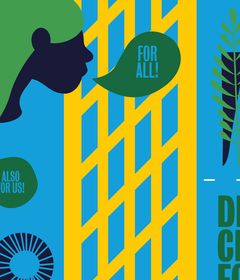In this three-part Designing Cities for All: RE-generation series RE-imagining Borders , DCFA Fellows Joris Lechêne and Lucia Kula delve into the concept of made-up boundaries, borders and binaries, and their implications in the world. How does thinking in dualisms influence our public spaces, systems and (hi)stories? Where does the concept of the (literal or metaphorical) border originate from, and who has the power to install and enforce them? And why is it so important to break away from this simplistic worldview?
This first episode delves into the dichotomy of Trends vs. Traditions by looking into gentrification. This concept is marketed as ‘upgrading’ areas to become new, trendy, exciting and full of opportunities. Paradoxically, marginalised communities who are fighting to exist in the urban landscape are as depicted as archaic, clinging onto traditions and opposed to innovation and development. In this scenario, who are the real drivers of change?
About the DCFA Fellows
Joris Lechêne is a Franco-British social communicator who has lived and worked in five countries and three continents. Black, queer, foreigner and neuro-divergent, Joris has spent most of his adult life disentangling his multiple marginalized identities in a world that simultaneously considers him both an out- and insider. As a Social Media Influencer and Anti-racism, Bias and Privilege trainer, he draws on his experience with the combination of the various identities at the intersections of ‘race’, neuro-diversity, class and sexuality. Joris uses this unique vantage point from which to communicate and explain social concepts and speak up on the topics of systemic inequalities, discrimination and bias.
Dr. Lucia Kula , SFHEA is an International Lawyer and Lecturer in Law and Gender at SOAS, University of London. Her research adopts an interdisciplinary approach to law, borders, gendered violence, and decolonization. She is a former refugee from Angola and writes on law and forced displacement issues and identity in the African diaspora, with a focus on critically analyzing the experiences of women and other marginalized communities. She convenes the Gender Studies and Law Programme, and she is the Widening Participation Lead for the School of Law within SOAS. She also consults for other Higher Education institutions in the UK on Race Equity and Decolonising The Academy.
About the speakers
Isabella Segalovich is a writer and educator who studies the intersections of craft, art, architecture, and politics. Her “anti-authoritarian folk art history” videos have amassed over 200 thousand followers across social media platforms. She is an author and TikTok correspondent for Hyperallergic, and also contributes articles to PRINT Magazine. Her research revolves around identifying white supremacy in the aesthetics of high art and design and the forces at play that silence solidarity movements through community art expression.
Eli Verboket (they/he), also known as drag artist Eli Express, is 23 years old, trans and non-binary. They can be found in the Amsterdam queer nightlife for five years now, as a drag artist, bartender, door host and activist. Eli was born and raised in Leiden, but Amsterdam is their second home. Eli’s activism is primarily related to fat liberation, trans inclusivity and mental health. Intersectionality and love are at the centre of their practice.
About Designing Cities for All: RE-generation
Over the first two years of Designing Cities for All (DCFA), we’ve learned about exclusion by design and the (re)design of inclusive cities. Along the journey, a certain question kept popping up: what exactly does ‘for all’ entail? After focusing mostly on the ‘who’ over the past two years, DCFA is rebooting as Designing Cities for All: RE-generation. This way around, the series is also incorporating the ‘what’ by looking through the fresh lens of regenerative design. This emerging field might very well be a promising answer to the challenges of our time, as it focuses on the design of products, services, systems and processes that lead to both social and ecological recovery and that keep the systems healthy.
About gentrification


Als jongen was Massih Hutak blij toen KFC eindelijk naar Amsterdam Noord kwam. Toen er nieuwe huizen kwamen en de eerste hippe winkels neerstreken ook, want de buurt werd er alleen maar beter van, toch? Maar algauw sloeg die blijdschap om in eerst verbijstering en daarna woede, want de oude sociale huurwoningen stonden er nog even vervallen bij. Woningen die vrijkwamen gingen de markt op en werden voor drie keer zoveel verkocht. Hij en andere jongens uit de buurt waren al tijden op zoek naar een huis, maar die nieuwe huizen bleken niet voor hen. Wel voor mensen met beduidend meer geld. Daar is een woord voor: gentrificatie.

Has the Reguliersdwarsstraat been Straightified?

We cannot let our cities descend into islands of privilege amid seas of disadvantage. With the right policies and investments, a better future is possible.

Under the cover of darkness on the night of March 27, 2017, housing activists snuck past the guards of two government-owned buildings in central Cape Town — a derelict hospital and an abandoned nursing home — and took up residence. The activists, who belong to a social movement called Reclaim the City, were protesting gentrification and what they saw as the government's failure to provide affordable housing in what remains, nearly three decades after the end of apartheid, a deeply divided city.
Nearly six years later, they're still there, and the occupations that started out as simple acts of political protest have grown into a large-scale community-building project that provides a home for some 2,000 people. The government says the buildings have been hijacked. The occupiers say they were left with no choice but to forcibly reclaim these spaces in a city that is gradually squeezing them out.











